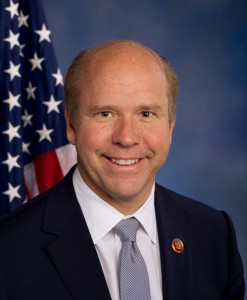Freshman congressman Delaney tackles big needs with innovative financing
By Len Lazarick
Freshman Congressman John Delaney on Wednesday plans to roll out his signature legislative initiative for his first term — a plan for a national infrastructure bank that requires no federal appropriations.
The proposal is an innovative financing measure that relies on the sort of economic opportunities Delaney exploited when he founded two publicly-traded financial services firms that have helped make him one of the richest members of Congress. The bank will be used by state and federal governments to guarantee or loan funds for infrastructure projects.
The Democrat from Potomac insisted on having an equal number of Democratic and GOP co-sponsors.
“I want this thing to be absolutely symmetrical,” Delaney said in an interview. “Submitting this legislation with no bipartisan support is just pointless” in a House of Representatives controlled by Republicans. But as an effort to fund U.S. needs for roads, bridges, airports, communications and school buildings, he says he’s rounded up support from the GOP and his own party, the U.S. Chamber of Commerce and unions.
How it works
The idea of a special bank to finance huge infrastructure needs is not new. President Obama has proposed one, as had former Sen. John Kerry, the Massachusetts Democrat who is now Secretary of State, and Sen. Kay Bailey Hutchison, the retired Texas Republican.
The difference in Delaney’s proposal is that Congress doesn’t need to pony up any money to finance it. The bank would be created using money from low-interest bonds to be purchased by multinational corporations. The idea is that they would use money they have made overseas but not brought back into the U.S. to pay for the bonds.
Perhaps American-based corporations are sitting on 2 trillion dollars, euros and other currencies in overseas banks — partly due to high U.S. corporate tax rates — and the corporations would get special tax credits to bring the money back. Delaney’s target is to raise $50 billion in corporate cash that be used to create $750 billion in infrastructure financing that would be used to insure the repayment of the infrastructure loans.
Only state and local governments could apply for the loans, and public-private partnerships would be encouraged.
Delaney admits he would prefer to have the infrastructure bank started with an appropriation, “but it’s not gonna happen,” he said.
Cutting through partisan gridlock
Delaney believes that his approach is an example of the way you can cut through the partisan gridlock in Congress.
Delaney, who beat longtime Rep. Roscoe Bartlett in the redrawn 6th Congressional District in the 2012 election, believes there are issues where Democrats should “hang tight, and fight the good fight” such as women’s rights, marriage equality and climate change.
But economic issues “are much more nuanced,” Delaney said, and “should not be approached from a strong ideological point of view.”
“They’re not that clear, they’re not that black and white,” and that includes entitlements such as Social Security and Medicaid, he said, “Entitlements are economic issues; they’re math.”
It’s that sort of talk that clearly puts Delaney in the moderate wing of a party that doesn’t typically tolerate such talk. But he was elected as one of the three co-presidents of the 55 freshman Democrats in the House.
“It’s given me a little more of a voice,” he said. He expects the president of the 30-member House Republican freshmen , Rep. Luke Messer of Indiana, to be a co-sponsor.
Delaney founded two corporate financing firms where he was chairman and CEO, but he says Congress in some ways is not all that different. ”I think business is much more collaborative than people think,” Delaney said, and you have to persuade people to your point of view.
But in business, there are often common goals among consumers, employees and shareholders. “In politics, the people you deal with have very strong interests and objectives that are not based rationally,” he said. “It is very frustrating to deal with uncompromising people.”
Here’s a column from last week’s Financial Times that discusses Delaney’s infrastructure plan (requires free registration to view) and a February story from Politico on the topic.

MarylandReporter.com is a daily news website produced by journalists committed to making state government as open, transparent, accountable and responsive as possible – in deed, not just in promise. We believe the people who pay for this government are entitled to have their money spent in an efficient and effective way, and that they are entitled to keep as much of their hard-earned dollars as they possibly can.

